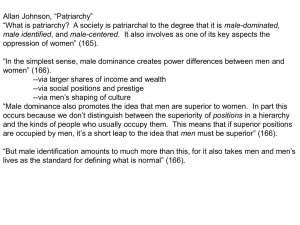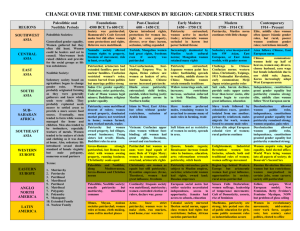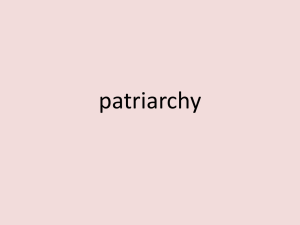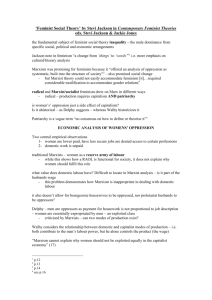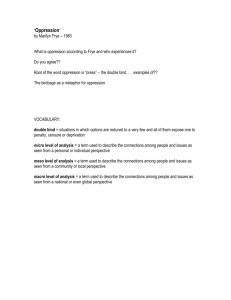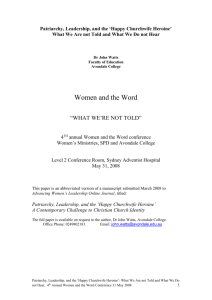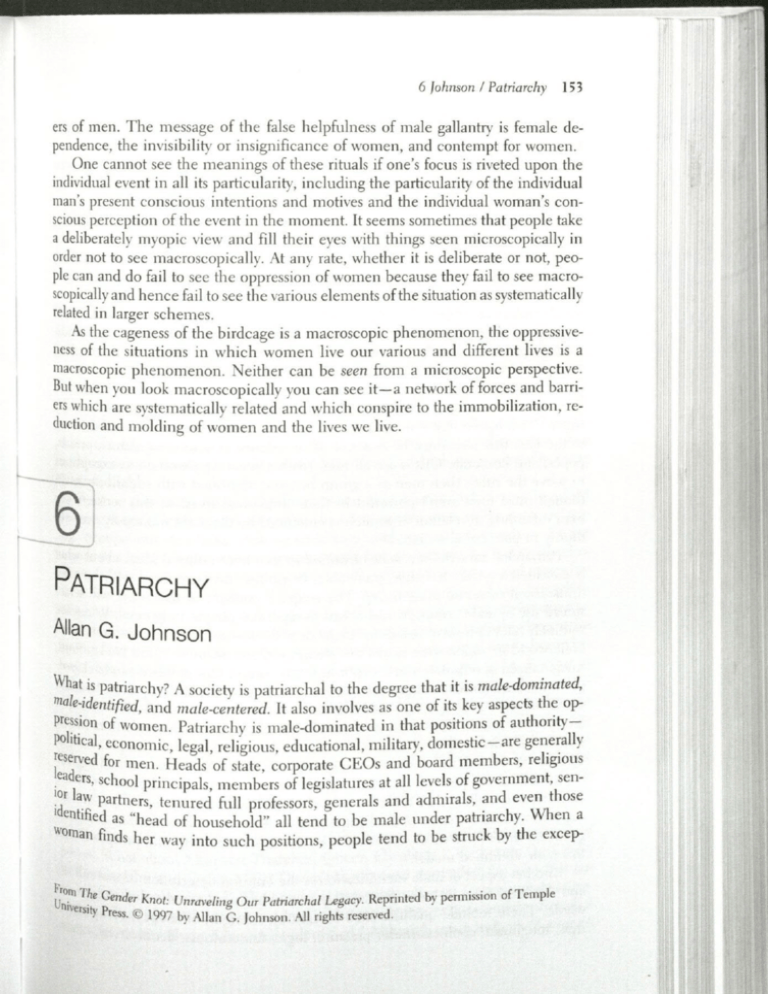
6 Johnson I Patriarchy
153
ers of men. The message of the false helpfulness of male gallantry is female dependence, the invisibility or insignificance of women, and contempt for women.
One cannot see the meanings of these rituals if one's focus is riveted upon the
individual event in all its particularity, including the particularity of the individual
man'spresent conscious intentions and motives and the individual woman's conscious perception of the event in the moment. It seems sometimes that people take
a deliberately myopic view and fill their eyes with things seen microscopically in
order not to see macroscopically.
At any rate, whether it is deliberate or not, people can and do fail to see the oppression of women because they fail to see macroscopically and hence fail to see the various elements ofthe situation as systematically
related in larger schemes.
As the cageness of the birdcage is a macroscopic phenomenon, the oppressiveness of the situations in which women live our various and different lives is a
macroscopic phenomenon.
Neither can be seen from a microscopic perspective.
But when you look macroscopically
you can see it-a network of forces and barriers which are systematically related and which conspire to the immobilization, reduction and molding of women and the lives we live.
6
PATRIARCHY
Allan G. Johnson
Whatis patriarchy? A society is patriarchal to the degree that it is male-dominated,
male·,dentified, and male-centered. It also involves as one of its key aspects the oppression of women. Patriarchy is male-dominated
in that positions of authorityPolItical, economic legal religious educational, military, domestic-are
generally
reserved for men. Heads
'"
of state, corporate CEOs and board mern b ers, re liai
IglOUS
leaders, school principals members of legislatures at all levels of government, sen;or law partners, tenured full professors, generals and admirals, and even those
dentIfied as "head of household" all tend to be male under patnarchy. When a
woman finds her way into such positions, people tend to be struck by the excep-
~ro.rnT~e Gender Knot: Unraveling Our Patriarchal Legacy. Reprinted by permission of Temple
n1verS11y P
Tess. © 1997 by Allan C. Johnson. All rights reserved.
154
Part II - Understanding R'
aC1Sm,
S'
eXISm,
Heterosexism, and Class Privilege
tion to the rule, and wonder how she'll
'
,
I
measure up agamst a man In the same poas a woman would be~;)y app y to mhen ("I wonder if he'll be as good a president
except per aps on tho
ions wh
ture into the devalued d
ti
d'
se rare occasions w en men vcnomes tc an other"
'"
k
then men's failllTc to
carmg wor most women do. Even
measure lip can be inte
t d
'
f
"
trained incapacity that act ua Il
' rpre e as a sign a superionty, a
diaper I'm no good at th t YtPfroltectstheir privileged status ("You change the
sor a tlmg")
In 'the simplest sensea male
d ' '
men and women. It Illea' r< oroln]anee creates power differences between
ns, lor examp e that m
I'
If'
come and wealth It me
th
'
en can c ann arger shares 0 10,
ans ey can sba
It
'
men's collective interest b c
< pe cu
ure III ways that reflect and serve
t I "
s y, ror example cant II'
I'd
e evrsion shows passing I
tl
II
'
ro IIlg he content of films an
,
,
aws iat a ow h b d
catmg rape and sexual I
us an s to rape their wives or adjudi.
tarassruenj cases i
h
'
t Iie d efendant On trial Mid'
n ways t at put the victim rather than
.
. a e ommance also
t
h id
penor to women, In part tin
promo es tel
ea that men are suIS OCcurs because \ d 't di
,
penon!}, of positions in a hi
I
ve on t istinguish between the suth
I TI '
terarc ly and the kin I f
I
I
em,
lis means that if
'
,,
(S a peop e w 10 usually occupy
t th id I
supenor POSitrons are
' Ib
o e I ea that men must b'
OCCUplCC
Y men, it's a short leap
po
d
e Supenor If presid t
I I '
pes, an Corporate CEO
II'
en s, genera s, egisiators priests,
t
th
s are a men (with c
k
'
a prove e rule) then m
a rew to en women as exceptions
th
I
'
en as a group beco
id if d '
aug 1 most men aren't
ful !
me I enh Ie WIth superiority even'
ma'n s stan d'mg in relation pOwer
u In. their ind' IVl'd ua I I'lVes. In this sense every.
t
1I 'k,'
a women tS enh
db'
lorr,! In patriarchal societies,
ance
y the male monopoly over alI, Patriarchal societies are male-identi
'
IS conSidered good, desirable
referabfed In that core cultural ideas about what
thInk about men and masculin~ty, Th e: Or normal are associated with how we
spread use of male pronouns a d
e SImplest example of this is the still wideroliltinelyrefer to human being;a ?,ouns"to represent people in general. When we
ba ICworld'
h' h
s man or to doct
"h"
.
In W IC Illen are. in th f.
ors as e, we construct a symmargInalized as outsiders and e
e oreground and women in the background,
pie Into s
b
xceptIons to the r I 2 (Th'
,
'
orne em arrassingly rid' I
u e,
tS practIce
can back peod escnbed
"
ICU ous corner
. h
man as a species that b
£
s, as m t e anthropology text that
amounts t
h
reast-Ieeds his
") B
more than this £ 'I
young,
ut male identification
do for muc
s ta nard
defi'
h
' or It a so takes
d
I
I
Ah
Inmg
w
at
is
norm
I
TI
'd
men
an
men's ives as t le
6 v- Our weeks ' d ~
a , le I ea of
£
'
'
'C
,IS
euned in ways th t
a career, lOr example WIth Its
a WI,e at ho
t
a assume the
I Id
'
't I
career-lO er has something like
Iaundl)' andme ak' perform the VIa
support work f t k'
,
ma 'Ing SUre th'
t
a a mg care of children doing
cuperation from the stress of ~re s a sa e" clean, comfortable haven for rest ~nd regenera II), do 't h
'
le competItrve male d
'
d
h·
n ave Wives they fi d' h
- ommate world. Since women
t IS male-identified model:
In It arder to identifY with and prosper within
Another aspect f
I'
and th 'd lama
e Identification i th
1
hie
I ea man in terms that cI I s e cu tural description of masculinity
Woe, These include qualities su hosey resemble the core values of society as a
ness , toughn ess, coo Iness under c as control
I .' str eng,th e ffi'lClency competitivepreSSure oglc t
f I
'
,
,
,
, orce u ness, decisiveness , rationsition. It's a test we fa I
•
'
<
<
o
•
6 lohnson I Patriarchy
155
ality,autonomy, self-sufficiency, and control over any emotion that interferes with
other core values (such as invulnerability)."
These male-identified qualities are associatedwith the work valued most in most patriarchal societies-such
as business,
politics,war, athletics, law, and medicine- because this work has been organized
in ways that require such qualities for success. In contrast, qualities such as
inefficiency, cooperation, mutuality, equality, sharing, compassion, caring, vulnerability,a readiness to negotiate and compromise, emotional expressiveness, and intuitive and other nonlinear ways of thinking are all devalued and culturally
associatedwith femininity and femaleness,
Of course, femaleness isn't devalued entirely, Women are often prized for their
beautyas objects of male sexual desire, for example, but as such they are often possessedand controlled in ways that ultimately devalue them, There is also a powerfulcultural romanticizing of women in general and mothers in particular, but it is
a tightly focused sentimentality (as on Mother's Day or Secretaries' Day) that has
littleeffect on how women are regarded and treated on a day-to-day basis, And, like
all sentimentality, it doesn't have much weight when it comes to actually doing
something to support women's lives by, for example, providing effective and affordablechild day-care facilities for working mothers, or family leave policies that allow
workingwomen to attend to the caring functions for which we supposedly value
'them so highly,
Because patriarchy is male-identified, when most women look out on the world
theysee themselves reflected as women in a few narrow areas of life such as "caring"occupations (teaching, nursing, child care) and personal relationships, To see
herselfas a leader, for example, a woman must first get around the fact that leadershipItselfhas been gendered through its identification with maleness and masculmI~ as part of patriarchal culture, While a man might have to learn to see hImself as
amanager, a woman has to be able to see herself as a woman manager who can succeedin spite of the fact that she isn't a man, As a result, any woman who dares strive
rorstanding in the world beyond the sphere of caring relationships must choose betweentwo very different cultural images of who she is and ought to be, For her to
assumereal public power-as in politics, corporations, or her church-she
must resolvea Contradiction behveen her culturally based identity as a woman, on the one
hand,and the male-identified position that she occupies on the other. For thIS reason the more powerful a woman is under' patnarc
'h y, th e more " unsex ed" she beCOmesin the eyes of others as her female cultural identity recedes beneath the
mantleof male-identified power and the masculine images associated with It. WIth
menthe effect is just the opposite: the more powerful they are, the more aware we
areofth'l
elr Ola eness. Power looks sexy on men but not on women.
..
But for all the pitfalls and limitations, some women do make it to pOSItIons of
What about Margaret Thatcher, Queen Elizabeth I, Cathenne the Great:
, ITaGandhi, and Golda Meir? Doesn't their power contradIct the Idea that pa
tnareh'
' h y can accommo date , a IImrt, y IS ma Ie-dominated? The answer is that patrlarc
chd number of powerful women so long as the society retains its essentIal patnarchal
aracter, especially in being male-identified4 Although some mdlvldualwomen
J
r~~ver.
156 Part 11- Unde"tanding R -
aClsm,
S
exum ' Heterosexism ,ass
and Cl
PnVl
- -lege
have wielded great power, it has alwa b
- _
_
chal model Each
ys een 10 societies orgaOlzed on a patriar- _
woman was surrounded b
f I
mmlsters bishops and wealth
-t
y power u men-generals,
cabinet
,
,
y arts ocrats or busi
h
II - ests she Supported and
ith
,
nessmen -II' ose co ective interdid
WI out wnorn she c Id
I
I d
I _And not one of these 11'0
ld h
au
not lave ru e as she
men cou
ave achie d d h Id h
-out embracing Core patria 'I
I
ve an
e
er position withrc
ia
va
ues.
Indeed
t
f
I
k
stan d out as so exceptional - th - b-I,par a what rna es these women
mascu lime: they've been to IShOyerr a I Ity to emb d va Iues cu Itura IIy defined as
.
ug er, more decisi
.
lng, an,d more emotionally controlled
lye, more aggressive, more calculatWOmens power however h
hi
than most men around them.' These
,'
, as not mg to do with h h
b
su ore mated under patria I I I
I II' et er women in general are
-rc 'Y_ t a so doesn't
h
ponhom of authority will by it If d
mean t at putting more women in
- Iia I character of the I se
0 much for
pa t narc
t
_
women un Iess we also change the
Ys
Since patriarchy identifie: ems In whhich they operate
_
Wit men th
t
-po werful b ut are instead dorni power
t d btl'
e vas malonty of men who aren't
tl 'd.
na e yo ter
-I
ie I ea of male dominance a d wid:
. men can sti I feel some connection with
ampl f
n WI men who a
.L I I
. e, or an ~nemployed workin -class m
. re ~owel.Jll. t is far easier, for exg
displays of patrrarchal masculine t h
an to Identrfy With male leaders and their
Upper-d U S p
oug ness than it - C
ass _ _ resident Georg B h"
ISlOr women of any class_ When
pie m
f II I
e us got tau h" -th S d
-' en 0 a c asses could identify -th hg WI a dam Hussein, for examth
- patnarCla
- I I values_ In
"I-ISway' male I-dentr-IiIcation gives ev WIth ISacting out a f b aSlc
eehm gsame sense of superiority oen tehmostlowly placed man a cultural basis for
('I' ICh ISwh
ya Construction worker ver C eI otherwis
_ _ e most h-IghI y placed woman
ua IIy harasses
II
-'
can lee wlthm h - - hts
a we -uressed profes . 1
IS ng
as a man when he sexIn addition to being male-d slOna woman who happens to walk by)_6 __
centered wh - h
ommated and m I -d -fi
entl led, patriarchy is maleth ey do '_PickIC means that the" ocus 0f attentlo_ a e-I
-,up
any
newspaper
Or
go
t
n
IS
pnmanly
on men and what
pr nnan yabout
a
any
mov;
tl
t
d
men and what th 'd
e lea er an you'll find stories
"'"J' a bout either W-th
ey ve One Or hav 't d
fus - I rare exceptions
en
one or what they have to
ships~,goverdHleir support work of do:n:otmelnbare portrayed as along for the ride,
,ProVI mg sam th s IC a or and
- t - - I
lOr men to fi h
mam ammg ave relatlonPlify men 'hSera - t e mg
I
Ig t over
b - csee - -h
ICS rugg e with the h
,or emg IOds that reflect or amIS \I at men dOdt
uman condif
If h '
If
I 0 create it and I
IOn_ t ere s a crisis what we
d
you want a story about h _ lOWmen dealt with it.
'
lira nee, or any f th
erOlsm, moral cour
..
nificanee
0
e struggles that give h
age, spmtual transformation, en, men and rna r Uman hfe ItS d
t
dsee what I
scu mlty are Usually th
_
eepes meanmg an slgean
and countmh , make a list of the twenty
e terms m which you must see it_ (To
ow many"
most Important
,
forms the p - f
Deus on men as th
movies you ve ever seen
Omt a the st ) M
e central chara t
h
represent hu
ory.
ale experie'
c ers w ose experience
lIlall experi
nce IS what pat - h I I
most oftel b
ence and the end h
narc a cu ture offers to
1 a out IVa
urmg t erne fn
A male c t
men m the actual livin f h S a I e, even when these are
en er oHocus got
em
most WOmen probabl
ISeverywhere_ Research
more, interru lin
y already know: that men do rna es clear, for example, what
business mee~ g mhore,and controlling co t
7n~ate conversations by talking
ngs, t ey often go unnoticed n enttlhen women suggest ideas in
un I a man rna kes t he same suggesC
k --
6 Johnson / Patriarchy
157
lion and receives credit for it (or, as a cartoon caption put it, "Excellent idea
Ms. [ones, Perhaps one of the men would like to suggest it"]. In classrooms at all
levelsof schooling, boys and men command center stage and receive the lion's
shareof attention.f Even when women gathcr together, they must often resist the
ongoingassumption that no situation can be complete or even entirely real unless
a man is there to take the center position. How else do we understand the experience of groups of women who go out for drinks and conversation and are approached by men who ask, "Are you ladies alone?" _
Women and Patriarchy
Atthe heart of patriarchy is the oppression of women, which takes several forms,
Historically,for example, women have been excluded from major institutions such
aschurch, state, universities, and the professions. Evcn when they've been allowed
to participate, it's generally been at subordinate, second-class levels. - - Because patriarchy is male-identified and male-centered, women and the work
they do tends to be devalued, if not made invisible_ In their industrial capitalist
form, for example, patriarchal cultures do not define the unpaid domestic work
thatWOmendo as real work, and if women do something, it tends to be valued less
thanwhen Illen do it. As women's numbers in male-dominated occupations increase,the prestige and income that go with thcm tend to decline, a pattern found
10 a variety of occupations,
from telephone operator and secretary to psychotheraplst9 Like many minorities, women are routinely repressed in their development
ashuman beings through neglect and discrimination in schools]O and in occupahonal hiring, development, promotion, and rewards_ Anyone who doubts that patnarchy is an oppressive system need only spend some time with the grow 109
hterature documenting not only economic, political, and other institutionalized
sexism,but pervasive violence, from pornography to the everyday realities of Wife
battering,sexual harassment and sexual assault.ll . ' .
The power of patriarchy 'is also reflected in its ability to absorb the pressures of
SUperficialchange as a defense against deeper challenges_ Every social system has
a certam amount of "give" in it that allows some change to occur, and ~~1
,th:
processleaves deep structures untouched and even invisible_ Indeed, the give
playsa critical part in maintaining the status quo by fostering illusions of fundamental change and acting as a systemic shock absorber. It keeps us focused on
symptoms while root causes go unnoticed and unremarked; and it deflects the
Powerwe need to take the risky deel,er journey that leads to the heart of patriarchy
and a LIrInvolvement in it.
We'd Rather Not Know
We'reas stu c k as we aTe pnmanly
- because we can ,'tt or won ac knowledge the roots
af patr- hi£
ing deeper
th Jarc y and our involvement in it. We show no ent llISlaSm or go
"
an a SlIr£ace a b session with sex and gender. We reSISt
- even saYI-ng the word pa-
158
Part II-Understanding
triarchy" in polite conversation, We act as if patriarchy weren't there, be~ause the
realization that it does exist is a door that swings only one way and we can t go back
again to not knowing, We're like a family colluding
in silence
over dark
secrets of damage and abuse, or like "good and decent Germans"
during the Holocaust who "never knew" anything terrible was being done, We cling to the illusion
that everything is basically all right, that bad things don't happen to good people,
that good people can't participate in the production
of evil, and that if we only
leave things alone they'll stay pretty much as they are and, we often like to think,
always have been,
Many women, of course, do dare to see and speak the truth, but they are always in danger of being attacked and discredited in order to maintain the silence,
Even those who would never call themselves feminists often know there is something terribly wrong with the structures of dominance
and control that are so central to life in modern societies and without which we think we cannot survive, The
public response to feminism has been ferociously defensive precisely because ferninism touches such a deep nerve of truth and the denial that keeps us from it, If
feminism were truly ridiculous, it would be ignored, But it isn't ridiculous,
and so
it provokes a vigorous backlash,
We shouldn't be too hard on ourselves for hanging on to denial and illusions
about patriarchy, Letting go is risky business, and patriarchy is full of smoke and
mmors that make it difficult to see what has to be let go of. It's relatively easy to
accept the Idea of patriarchy as male-dominated
and male-identified,
for example,
and even as male-centered, Many people, however, have a much harder time seeIIlg women as oppressed,I2 This is a huge issue that sparks a lot of arguments,
and
forthal reason It will lake several chapters to do it justice, Still, it's worthwhile
outllIlmg a basic response here,
The reluctance to see women as oppressed has several sources, The first is that
many women enjoy race Or class privilege and it's difficult for many to see them
ed
as o:press
without, as Sam Keen put it, insulting "truly oppressed"
groups such
asI t e IOII-er classes or raclalminorities,ll
How, for example
can we count upperc ass women among the
d
d I
'
?
AI h
oppresse an ower-class men among their oppressors,
I ough Keen's obl'ecr
h
"
,
b
hi'
, of worn Ian asd a certam logIC to it ' it rests on a confusIOn
ellVeen t le posItion
,
'fy
"C
I"
en
an
men
as
groups
and
as
individuals,
To
Identl
lema e as an oppressed t t
d
'
IT
doesn't
mean that every
woman 't
sUllers
I'Is consequences to s a1us un I der patnarchy
'
'"
,
Inean tl tal
la every person of
Iequa fj; egree, Just as Iivmg m a racist socIety doesn
h
equally in the b
fi
f co or su ers equally or that every white person s ares
ene ItS a race pnvlle
L"
,
h
r
that e \ery
'
woman must come t
.ge. .IVmg III, patriarchy does mean ' oweve,h t
whatever she ach'
'II b
0 gnps wIth an mferior gender
posilion and t a
leves WI e in sP't
fth
' ,
,
f hid
care and other do
t'
k
Iea
at POsItIon, With the exceptIOn a c I
mes IC war and
~
'd
'
almost every field of ad It d
a ew pal occupations
related to it, women m
are inferior to men th tUtl en eavor must labor under the presumption
that they
, ,
, a ley are mterlope
f
h
'
'h
ust
Justify their participatio
M
rs rom t e margms of socIety w a m
ethnicity
'
or other m'
6 Johnson / Patriarchy
Racism, Sexism, Heterosexism, and Class Privilege
n:ty en may have such experiences because of their race,
man
standmg btl
'f
' u rare y I ever because they're men.
It is in this sense that patriarchies ,
vidual men may not feel dominant,
159
I d
' t d
en though most indiare I~la e-. omma. e eVother men This is a
etpecI~lly
III
r~~~~o;~~~t societies,
~ords
like
~~ucial ins~:~ta~~r~;~r~:i~~~'
f~~:~r~~~ ~e~a~i::s
between categorieds of pe~ple
amman .
"
I
d u er classes, or women an men,
ow
such as whites and Hispanics,
ower an
pp
, di 'duals is another issue,
dominance and oppression
actually play oUftdamontgh ,tn r'~~,ote male privilege in
'c
1"
deology
a set 0 I eas
a P
Sexism, ror exa,lllp e, IS an I.
' '
men But de ending on other social facpart by portraying women as inferior to I
'
'II P in their ability to take ad' dividua men WI vary I
,
I
tors such as race, c ass, or age, I~ I.
d
W
nake a similar argument
'
d h b
f t It pro uces
e can I
vantage of sexism an t e ene I s
I'
ine t
bordinate group, Upperice th
for be ongmg a a su
about women and the pnce t ey pay
d
f m the oppressive effects
'I
ted to some
egree ro
I
class women, for examp e, are msu a
discri
t' 1 'In the workplace, Their
iarch
ch
as
rscnrnma
101
d
of being women un er patnarc y, su
hei
b dinate standing as women,
,
,
p't
of t ell su or I
14
class privilege, however,
exists 111 s Ie,
II in relation to husbands,
which they can never completely
overcome,
eSIPeclladY I luing of women's bodies
'
,
C
Ie to the cu tura
eva
f
No woman IS Immune,
ror exampie,
,
d nri t lif or the ongoing threat a
'
I'd'
bl c an pnva e I e,
as sexual objects to be exp cite
III pu
I,
I
t
rful woman in the land
' I
T
st t re mos powe
sexual and domestic VIO ence.
0 a rap',
I
ythi g else culturally marks
m
is first and foremost a woman, an d thi IS Inore than an
her as a potential victim,
d'
t seeing men as a privileged
.
resse
we resis
ff
Along with not seemg women as opp
'h
re of their own su er'11 t
of men w 0 are awa
Oppressor group, This is especia
y rue
b h
ssed because of their gen,
d
n are ot oppre
f
mg, who often argue that men an wome
b dl
en do suffer because 0
der and that neither oppresses the other. Undou te y me oppressed as men, For
, Ily, b ut Iit ISn
i 't because I men
, If '
their' participation
in patnarc
d
Iar ing of femaleness
Itse
, I' k d t
cultura
eva UI
d
women, gender oppression
IS m -e
0 a,
'b
tlley are culturally
ed
nfenor
ecause
I
Women are subordinated
anc I treate
as "d
th ' minorities are deva ue d
fi
'racialas lllany
med as inferior as women, just
.an Me mcI owever do not su ffer b e, I b
"I
d to be whIte,
en, 1
,
,
Simp y ecause they aren t conS!c ere
'I
t'on to some hIgher, more
d
status
III re a I
cause maleness is devalued as an oppresse
ff
en-and
not because
h t
en su er as m
I
Powerful one, Instead, to the extent t a, m ,
" b ause they belong to t le
they're also poor or a racial or ethmc mlllonty-It
s ec
hich both privileges
dOminant gender group in a system 0 f ge nder oppreSSIon, w
them and exacts a price in retUTll,
t
press itself. A group can
Ak
'
h"
tl t a group canno op
"
ty
ey to understandlllg
t IS IS 13
ff fr
their I)osition III SOcIe '
'fl'
"
'b
scan
su
er
am
t
f
m ICt mlury on itself, and ItS mem er
'I If e tUTll the concep
0
B '
ut If we say that a group can oppress or persecute, II I se wI'
ed suffering, w HC h I't
'
for socIa y caus
SOCIaloppression
into a mere synonym
between different groups
' , 15
,
that happens
"
ISnt. Oppression
is a SOCIal phenomenon,
h
h which one group IS pOS!in a society' it is a system of social inequahty
t ,roug d bordination
of another.
"
h
I 'tatlOll an su
b
honed to dominate and benefit from t e exp 01
'If
b t also that it cannot
e
Th'IS means not only that a group canna t oppress Itse 't, ubetween groups, nO t beoppressed by society, OppressIOn"
IS a re Ia r 10n that exlS s
hveen groups and society
as a whole,
160
Part II-Understanding
Racism, Sexism, Heterosexism,
and Class Privilege
6 [chnecn I Patriarchy
f
To understand oppression, then, we must distinguish it from suffering that has
other social roots. Even the massive suffering inflicted on men through the horrors
..
. ..
in its Ion evolutionary process of turning into
menIII partIcular-to
participate
II .
and there's nothing we can do
somethingelse. Patriarchy is our co echve eg~cr; But we can do a lot about what
aboutthat or the condition III which we receive
.
wepasson to those who follow us.
of war is not an oppression of men as men, because there is no system in which a
group of non-men enforces and benefits from men's suffering. The systems that
control the machinery of war are themselves patriarchal, which makes It ImpossIble for them to oppress men as men. Warfare does oppress racial and ethnic rrunorities and the poor, who are often served up as cannon fodder by privileged
classes whose interests war most often serves. Some 80 percent of all U.S. troops
who served in Vietnam, for example, were from working- and lower-class backgrounds.!" But this oppression is based on race and class, not gender..
. If war
made men truly disposable as men, we wouldn't find monuments and cemetenes
in virtually every city and town in the United States dedicated to fallen soldiers
(with no mention of their race or class), or endless retrospectives on the fiftieth anniversary of every milestone in World War II.
NOTES
1. See Marilyn
Signs5 (1980):482-493; Casey Miller and Kate SWI.'d or dS ~ lIy L. Hacker, "Sex Role
. 1991) ; an d ] ose phW . Schnei Ter anIs' A aCase in the SOCiO
. Iogy 0f
(New
York:Harpe-Collins,
Imagery in the Use of the Generic
'Man'
In
Introductory
ex.
Sociology,"
American Sociologist
8 (1973): 12-18.
I ere but cultural ideas about
1d femininity
,
3. Note that I'm not descri ibi1I1g ac t ua I n len and women
I"'
playa camp Iex
. IlY. A s COIlC epts , mascu nuty an
men and women under patnarc
role in patriarchal societies.
tai number of powerful people
.
4. Just as a white-racist society
can acco~llmo. date
"1 a eer dam
the institutions that support itI .
ofcolor so long as they do not challenge white prtvi ege an
h fa King: Elizabeth I and
0
5. See, for example, Caro Ie LeVI1l. ,s Th e Heart
. and
. Stomac
f P rsylvania
Press, 19 94) .
the Politics of Sex and Power (Philadelphia: University 0 ~n~ hI' Harassment (Berkeley:
6. See Carol Brooks Gardner, Passing By: Gender an
u IC
brances do more than sanctify sacrifice and tragic loss, they also sanctify war itself
and the patriarchal institutions that promote it. Military leaders whose misguided
orders, blunders, and egomaniacal schemes brought death to tens of thousands, for
immunity
framed in images of noble tragedy and heroic masculine endeavor. In stark contrast to massive graveyards of honored dead, the memorials, the annual speeches
and parades, there are no monuments to the millions of women and children
caught in the slaughter and bombed, burned, starved, raped, and left homeless. An
University
of California Press, 1995).
bi L k ff Language and Woman's
7
.
tiion, se.e Ro 111 a 0. Th
,
· For more on gender and mtcrac
Politics of Language I 11
Ilace(NewYork: Harper and Row, 1975) and Talkmg PO'lveTr. en Conversational Style:
au r L'IV"(NewYork: Basic Books, 1990) . See aIso Debora
1 anne,
984)'
idem You lust Don ,t U n derim I'
T
.
N
d
N
J
.
Ablex
1
,I
,
ayzmg alk among FTJends ( orwoo,
.,.
\'1'11'
Morrow
1990).
.
stand:Women and Men in Conversation (New York: l laHm S hoots Shortchange GirlS
8· See American Association of U·ruverst ity Women
ow c 1992); and Myra Sa dker
.'
(Washington,
D.C.: American Association of University
Cheat Girls (New York:
ondDavidM. Sadker, Failing at Fail11ess: How Amenca s
"
estimated nine out of ten wartime casualties are civilians, not soldiers, and these
include a huge proportion of children and women,18 but there are no great national cemeteries devoted to them. War, after all, is a man's thing.
Perhaps one of the deepest reasons for denying the reality of women's oppression is that we don't want to admit that a real basis for conflict exists between men
and women. We don't want to admit it because, unlike other groups involved in
SOCialoppression, such as whites and blacks, females and males really need each
other, if only as parents and children. This can make us reluctant to see how patriarchy puts us at odds regardless of what we want or how we feel about it. Who
wants to consider the role of gender Oppression in everyday married and family
hfe? Who wants to know how dependent we are on patriarchy as a system, how
deeply our thoughts, feelings, and behavior are embedded in it? Men resist seeing
the oppression of their mothers, wives, sisters, and daughters because we've particIpated In It, benefited from it, and developed a vested interest in it. ...
. We can move toward a clearer and more critical awareness of what patriarchy
IS about, of what gets in the way of working to end it, and new ways for all of us-
of Ian uage affect people's per-
2. There is a lot of research that shows how su~h u~s
]' g Generics: Does Generic
teptions. See for example, Mykol C. Hamilton, "Using I as c ume 11!l2 (1988) 785-799;
,
'
..
h U 'I
gery?" Sex Ro es l 9, nos.
"
He'Increase Male Bias 11l t e ser s ma.
Th C
for Nonsexist Language,
I 'H e 1M an ' Approach:
WendyMartyna, "Beyond the
I
.. ft ease
W d nd Women, update d e.d
17 But these ritual remern-
example, earn not ridicule, disgust, and seam but a curious historical
French, Beyond Power: On Men, Women, and Morals (New York Sum-
milBooks,1985), 303
Rather than devalue or degrade patriarchal manhood, warfare celebrates and
affirms it. As I write this on the fiftieth anniversary of the Normandy invasion, I
can't help but feel the power of the honor and solemn mourning accorded the
casualties of war, the deep respect Opponents often feel for one another, and the
countless monuments dedicated to men killed while trying to kill other men whose
names, in hun, are inscribed on still more monuments.
161
rc:
Ch'llesScribner's Sons, 1994).
. W k a rd Comparable Worth, An9· See Paula England and D . D unn, HE v aluating
or ,
.
nuaj Review of Sociology 14 (1988): 227-248.
H Schools Shortchange Girls;
10. See American Association of University Women,
ow
ondSadkerand Sadker Failing at Fail11ess.
W
n and Rape (New York:
'
. 0 ur Will· . Men
ome,(New York: E.' P Dutton ,
. Ii. See Susan Brownmiller,
Agall1st
Strnon
19 and Schuster 1975)· Andrea Dworkin, Woman. atl';! encan Women (New York:
74); SusanFaludi ' Backla'sh: The Undeclared War AgQl~1St,'~ en (New York: Summit
CI'
B OwnPublishers, 1991)· Marilyn French, TleI W ar Agamst
II R "om
pe in Mannage (New Y or.k:
Oaks 1992)
'.
O'
E H Russe,
a
M '.
; Cardner, Passl11g By; lana . . Cl 'ld Sexual Abuse, an d Workplace
.
acnullan,1982)· idem Sexual Exploitation: Rape,
11 1'.1 d'
I News and PerspectIves,
I "a.ssment (Beve:ly Hill;, Calif.: Sage Publications, 198~~0)' ~;~a Laura Lederer, ed., Take
Durn,l o{the American Medical Association 264, nO. 8 (l
.
,
H'
I
I~
I
]1

